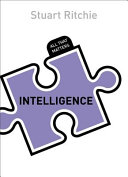
Intelligence
By - Ritchie, Stuart (Stuart J.)Call Number: 153.9 RIT
Physical Description: 147 pages : illustrations ; 18 cm
Notes: Includes Reference and Index
There is a strange disconnect between the scientific consensus and the public mind on intelligence testing. Just mention IQ testing in polite company, and you'll sternly be informed that IQ tests don't measure anything "real", and only reflect how good you are at doing IQ tests; that they ignore important traits like "emotional intelligence" and "multiple intelligences"; and that those who are interested in IQ testing must be elitists, or maybe something more sinister. Yet the scientific evidence is clear: IQ tests are extraordinarily useful. IQ scores are related to a huge variety of important life outcomes like educational success, income, and even life expectancy, and biological studies have shown they are genetically influenced and linked to measures of the brain. Studies of intelligence and IQ are regularly published in the world's top scientific journals. This book will offer an entertaining introduction to the state of the art in intelligence and IQ, and will show how we have arrived at what we know from a century's research. It will engage head-on with many of the criticisms of IQ testing by describing the latest high-quality scientific research, but will not be a simple point-by-point rebuttal: it will make a positive case for IQ research, focusing on the potential benefits for society that a better understanding of intelligence can bring.